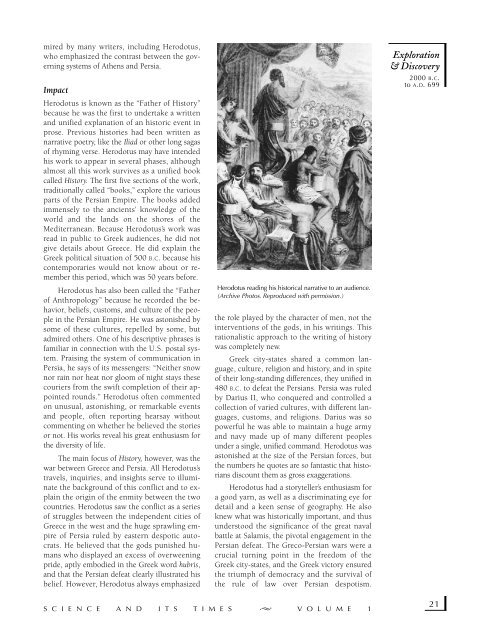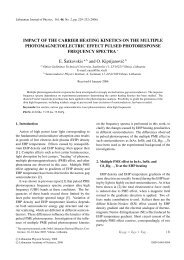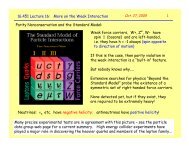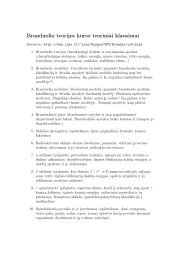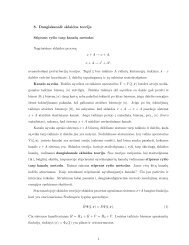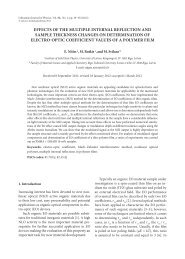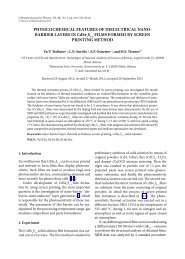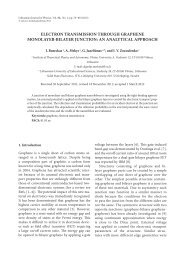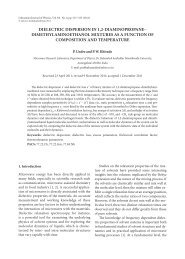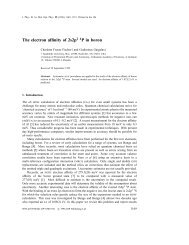Gale - Science and Its Times Vol 01 (2000 BC to AD 699).pdf
Gale - Science and Its Times Vol 01 (2000 BC to AD 699).pdf
Gale - Science and Its Times Vol 01 (2000 BC to AD 699).pdf
You also want an ePaper? Increase the reach of your titles
YUMPU automatically turns print PDFs into web optimized ePapers that Google loves.
mired by many writers, including Herodotus,<br />
who emphasized the contrast between the governing<br />
systems of Athens <strong>and</strong> Persia.<br />
Impact<br />
Herodotus is known as the “Father of His<strong>to</strong>ry”<br />
because he was the first <strong>to</strong> undertake a written<br />
<strong>and</strong> unified explanation of an his<strong>to</strong>ric event in<br />
prose. Previous his<strong>to</strong>ries had been written as<br />
narrative poetry, like the Iliad or other long sagas<br />
of rhyming verse. Herodotus may have intended<br />
his work <strong>to</strong> appear in several phases, although<br />
almost all this work survives as a unified book<br />
called His<strong>to</strong>ry. The first five sections of the work,<br />
traditionally called “books,” explore the various<br />
parts of the Persian Empire. The books added<br />
immensely <strong>to</strong> the ancients’ knowledge of the<br />
world <strong>and</strong> the l<strong>and</strong>s on the shores of the<br />
Mediterranean. Because Herodotus’s work was<br />
read in public <strong>to</strong> Greek audiences, he did not<br />
give details about Greece. He did explain the<br />
Greek political situation of 500 B.C. because his<br />
contemporaries would not know about or remember<br />
this period, which was 50 years before.<br />
Herodotus has also been called the “Father<br />
of Anthropology” because he recorded the behavior,<br />
beliefs, cus<strong>to</strong>ms, <strong>and</strong> culture of the people<br />
in the Persian Empire. He was as<strong>to</strong>nished by<br />
some of these cultures, repelled by some, but<br />
admired others. One of his descriptive phrases is<br />
familiar in connection with the U.S. postal system.<br />
Praising the system of communication in<br />
Persia, he says of its messengers: “Neither snow<br />
nor rain nor heat nor gloom of night stays these<br />
couriers from the swift completion of their appointed<br />
rounds.” Herodotus often commented<br />
on unusual, as<strong>to</strong>nishing, or remarkable events<br />
<strong>and</strong> people, often reporting hearsay without<br />
commenting on whether he believed the s<strong>to</strong>ries<br />
or not. His works reveal his great enthusiasm for<br />
the diversity of life.<br />
The main focus of His<strong>to</strong>ry, however, was the<br />
war between Greece <strong>and</strong> Persia. All Herodotus’s<br />
travels, inquiries, <strong>and</strong> insights serve <strong>to</strong> illuminate<br />
the background of this conflict <strong>and</strong> <strong>to</strong> explain<br />
the origin of the enmity between the two<br />
countries. Herodotus saw the conflict as a series<br />
of struggles between the independent cities of<br />
Greece in the west <strong>and</strong> the huge sprawling empire<br />
of Persia ruled by eastern despotic au<strong>to</strong>crats.<br />
He believed that the gods punished humans<br />
who displayed an excess of overweening<br />
pride, aptly embodied in the Greek word hubris,<br />
<strong>and</strong> that the Persian defeat clearly illustrated his<br />
belief. However, Herodotus always emphasized<br />
Herodotus reading his his<strong>to</strong>rical narrative <strong>to</strong> an audience.<br />
(Archive Pho<strong>to</strong>s. Reproduced with permission.)<br />
the role played by the character of men, not the<br />
interventions of the gods, in his writings. This<br />
rationalistic approach <strong>to</strong> the writing of his<strong>to</strong>ry<br />
was completely new.<br />
Greek city-states shared a common language,<br />
culture, religion <strong>and</strong> his<strong>to</strong>ry, <strong>and</strong> in spite<br />
of their long-st<strong>and</strong>ing differences, they unified in<br />
480 B.C. <strong>to</strong> defeat the Persians. Persia was ruled<br />
by Darius II, who conquered <strong>and</strong> controlled a<br />
collection of varied cultures, with different languages,<br />
cus<strong>to</strong>ms, <strong>and</strong> religions. Darius was so<br />
powerful he was able <strong>to</strong> maintain a huge army<br />
<strong>and</strong> navy made up of many different peoples<br />
under a single, unified comm<strong>and</strong>. Herodotus was<br />
as<strong>to</strong>nished at the size of the Persian forces, but<br />
the numbers he quotes are so fantastic that his<strong>to</strong>rians<br />
discount them as gross exaggerations.<br />
Herodotus had a s<strong>to</strong>ryteller’s enthusiasm for<br />
a good yarn, as well as a discriminating eye for<br />
detail <strong>and</strong> a keen sense of geography. He also<br />
knew what was his<strong>to</strong>rically important, <strong>and</strong> thus<br />
unders<strong>to</strong>od the significance of the great naval<br />
battle at Salamis, the pivotal engagement in the<br />
Persian defeat. The Greco-Persian wars were a<br />
crucial turning point in the freedom of the<br />
Greek city-states, <strong>and</strong> the Greek vic<strong>to</strong>ry ensured<br />
the triumph of democracy <strong>and</strong> the survival of<br />
the rule of law over Persian despotism.<br />
Exploration<br />
& Discovery<br />
<strong>2000</strong> B.C.<br />
<strong>to</strong> A.D. <strong>699</strong><br />
S C I E N C E A N D I T S T I M E S V O L U M E 1<br />
21


